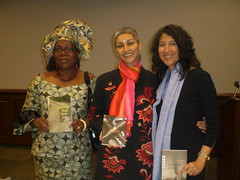
Poetry Reading: Patricia Jabbeh Wesley,
Shailja Patel and Gebeba Baderoon
Originally uploaded by LAUSatPSU
Patricia Jabbeh Wesley, Gebeba Baderoon and Shailja Patel entered Foster Auditorium like a storm two weeks ago. Thirty minutes before their poetry reading was scheduled to begin, I watched them strategize about microphones and drag the book table from its usual corner to the center of the room. While they were laboring, Wesley readjusted her gold and black head wrap and exhaled, “My son keeps telling me I’m in the 1%, but I promise, I’m a poet, I’m in the 99!”
Even as a professor at Penn State Altoona, Wesley was aware of the Occupy movement in University Park. Again, these poets reminded me how poetry is never far from a social consciousness. Throughout the evening, Wesley, Baderoon and Patel shared poems about their life travels that led them out of Africa. These three poets who represented Africa for an evening gave a unique perspective on America from the outside in.
Baderoon started the evening humbly. Referring to her fellow poets for the evening, she said, “I’m going to read as the opening act to the grown-up poets.”
She read a poem called “Old Photographs” about her coming to America, which she admitted she did for love. Because Baderoon started with an open source love poem to South Africa, she paused to contemplate before her next poem: “You might wonder why I left. That’s a mysterious question. I don’t quite know yet…if I have left.”
When she contemplates her lover in “Old Photographs,” Baderoon asks, “Was this the beginning of leaving?” It was clear to the audience that we were seeing a South African woman, even in the midst of our American world. She never lost what it was in her to be South African because she continued to mine that identity in her writing.
Wesley came to the podium next with her poem “Home Coming.” She gave the popole chant of mourning before she began, which she translated as “The world is ending, come, we finish.” In the Liberian civil war, Wesley said her brother, her brother-in-law and her brother-in-law’s entire family were drowned by the military. The hurt inspired her to write about what it would be like for her to go home after that tragedy, after so much time away.
She started her poem “Home Coming” with the line, “I don’t want to be a stranger when I come home/ I want my brothers to take me in.” Wesley later asks, “If they kill all my brothers/ who will welcome me home?” She wants to return to Liberia so her brothers can recite her praise names, in their proper order, to incessant drumming.
Wesley concluded her portion of the reading with a poem “for [her] children growing up in America.” For her that was a foreign concept and she said that sometimes it was sad to think that her children were only growing up in America, even though she did ultimately love the country.
Patel went through a similar love-hate relationship with America and closed the evening with a portion of her “Migritude,” which she read by memory. Migritude is a word that Patel made up to create the image of a migrant with attitude. Being a third generation Indian in Kenya who was then deported to England and eventually made her way to California, Patel knows a thing or two about being a migrant.
In “Migritude,” Patel detailed the story of her parents flying to visit her and her sister in San Francisco. Her parents got detained in the airport, after flying for 17 hours, because of some small inconsistency on their passports. And when her mom hears the customs officer saying he’s hungry, she offers him a bit of her sandwich even though she’s just been traveling for 17 hours and isn’t even allowed to leave the airport in America. But as Patel’s Migritude shows, she learned from her mother to love the people around her.
Patel’s final offering of the evening was to discuss her open source love poem to Oakland, California, which closed the evening on another Occupy movement reference. She detailed how Occupy Oakland had come for the city she loved and the people she loved. Baderoon and Wesley both praised Patel for the recurrence in her poem of “the city I love” and “the people I love,” because, after all, their evening of poetry together was about love – love of each other, love of poetry, and most importantly love of the respective places that these women have found themselves in their lives.
